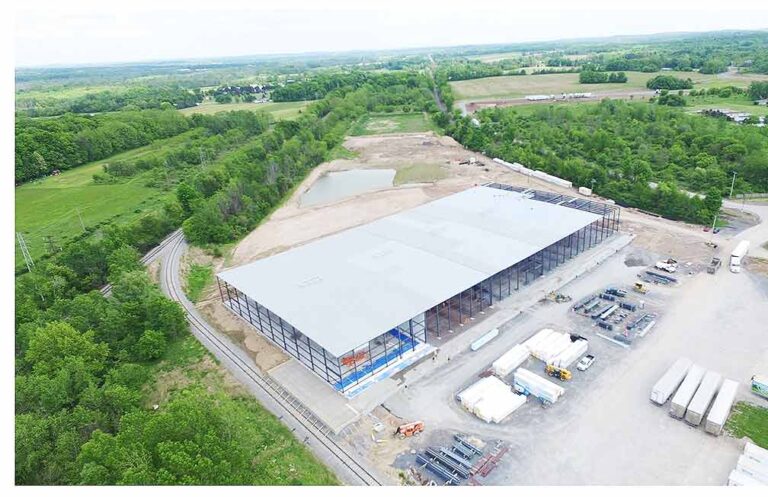
FARMINGTON, N.Y. – Leonard’s Express will celebrate the construction of their new state-of-the-art, temperature-controlled warehouse on June 9.
The 114,500 square-foot refrigerated warehouse meets the most stringent requirements for storing temperature-controlled products. The building is comprised of five 20,000 square foot rooms, each of which can be temperature controlled between -10- and 45-degrees Fahrenheit. Located in Shortsville, New York, this new facility has already begun to have a positive impact on the local economy.
Leonard’s Express will celebrate the construction of the warehouse with a topping-out ceremony and press conference at 2 p.m. on Thursday, June 9, at 3740 Walters Lane in Shortsville, New York.
“This will be a big day for our company, and especially for the dedicated employees who made this warehouse happen,” CEO Ken Johnson said.
Members of the Leonard’s Express leadership team, workers and other guests will sign the topmost warehouse beam before it is erected, and refreshments will be served. Joining in the ceremony are Chrisanntha Construction Corporation‘s owner Kevin Bragg, whose company directed the facility’s design and construction, and New York State Assemblyman Jeff Gallahan, whose 131st District covers Ontario County and parts of Seneca County.
Warehouse expected to have significant positive impact
The warehouse in Shortsville, New York, will act as a distribution point for Upstate New York, eastern Canada and the entire Northeast Corridor. Located just minutes from the New York State Thruway (Interstate 90), the facility also has rail spur access to the Finger Lakes Railway.
“Our customers need to deliver their products quickly and efficiently,” Johnson said. “We believe the warehouse will maximize transportation opportunities for them, while minimizing costs and risks for perishable cargo. We expect it to foster and enable the economic development of the county, and the Rochester area.”
The new refrigerated warehouse has already begun to have an impact on the Upstate New York economy, immediately employing workers to renovate a facility that was vacated when Great Lakes Kraut closed their local plant.
“In 2019 this property was going to be shuttered,” Johnson said.” We purchased it and turned it into a viable business, and now we’re investing in that property and in the community. As the warehouse becomes operational in the next few months, we’ll be adding more staff to manage it.”
The warehouse is designed to meet vital customer needs on many levels, according to the company.
For starters, carriers can pull their vehicles into a refrigerated loading dock, then open the truck’s doors, so there’s no risk of damaging cargo with a sudden temperature change.
In addition, ethernet communication technology allows authorized end users to log into the refrigeration system remotely and adjust temperature, barometric pressure, heaters and fan motors — all from a mobile app or computer. The building is also energy efficient, with floor insulation and a heated Glycol loop, which prevent floor heaving from permafrost in freezers used over extended periods of time.
The facility’s security system monitors activity both inside and outside the buildings, which also strengthens chain of custody compliance.
“This project showcases some of the most advanced technology available for refrigerated warehouses and reinforces Leonard’s Express’ position as an elite transportation services provider,” Kevin Bragg, owner of Chrisanntha Construction Corporation, said.
“Leonard’s will use remote sensing of room temperatures, fans, and compressors so they know if any of the components go offline. If coil pressures increase or decrease, Leonard’s employees will be alerted to potential maintenance issues before they become catastrophic. The drive-through dock technology, where trailer doors are not opened until the truck is sealed to the building, was developed for the food industry to minimize pest infiltration, and in this case, to minimize ambient air entering through an open load dock door prior to a truck connection. All of these features are key to keeping perishable foods fresh and significantly reducing energy costs.”
Joseph Price has been a journalist for almost two decades. He began in community media in 2005 and has since worked at media outlets in Virginia and Arkansas. He is also a commercial drone pilot and video editor. He hosts a weekly community radio show focused on goth, metal and industrial music that airs Wednesday evenings at 6 p.m. at www.kuhsradio.org.







